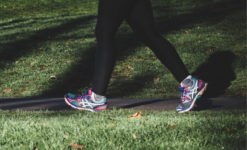
Why Fit More Walking Into Your Life?
Ask Mr. Pedometer and Friends…on Walking
September 4, 2019
Q: Mr. Pedometer, you may have said this before, but please tell me again: Why should we try to fit more walking into our life?
A: When Vivek Murthy was United States’ surgeon general, he “prescribed” a single activity for America to reduce the risk of obesity, diabetes, and cardiovascular disease. Here are the nine reasons cited by Anna Almendrala, healthy living editor of the Huffington Post, for making walking an important part of your life:
LOWER RATES OF OBESITY – “A 2015 study found that even walking just 20 minutes a day can reduce your risk of premature death by 30 percent, and the Mayo Clinic notes that 30 minutes a day burns about 150 calories, which can help you reach a calorie deficit that leads to weight loss.”
PREVENT DIABETES – “Walking helps regulate blood sugar levels, which in turn keep insulin levels low and diabetes at bay.  In fact, walking for 15 minutes after every meal helped regulate blood sugar levels just as effectively as one 45-minute walk per day, according to a 2013 study, which is good for Americans daunted by one big walking session.”
In fact, walking for 15 minutes after every meal helped regulate blood sugar levels just as effectively as one 45-minute walk per day, according to a 2013 study, which is good for Americans daunted by one big walking session.”
GOOD FOR YOUR HEART – “If you walk at a clip where it feels comfortable to talk, but not comfortable enough to sing, then your heart is getting a great workout, Murthy noted.”
GENTLE ENOUGH FOR NEARLY EVERYBODY – “Pregnant? Morbidly obese? Arthritic? Walking is gentle enough for most people who have these conditions, doctors agree, and the activity can ease the pain of chronic illness – even if you have to start off with just two minutes a day.”
IMPROVES YOUR MOOD – “Moving your body is a well-known way to release endorphins, a set of feel-good chemicals that dull pain receptors in the brain, sedate you, and even give you a feeling of happiness and euphoria. That’s why exercise in general, and walking in particular, is recommended to help improve symptoms of mild to moderate depression”
HELPS YOU SLEEP BETTER – “There’s a reason that travel experts advise you to walk around a new city on the day you arrive. Exposing your body to the sunlight and staying outside until it grows dark helps recalibrate the hormone melatonin to your new surroundings and time zone. As melatonin rises, so do feelings of sleepiness.”
WALKING IS AFFORDABLE AND ACCESSIBLE – “There’s no gym membership, fancy exercise clothing, or even walking-specific shoes you need to start. You also don’t have to be trained to learn how to walk properly. All you need is a pair of comfortable, supportive shoes!”
MEET YOUR NEIGHBORS – “One in two Americans don’t know their neighbors. Remedy that today by taking a walk around your block. You’d be surprised at how many friendly faces you see and meet!”
INCREASE YOUR CHANCE OF SEEING BIRDS, BUTTERFLIES, AND SUNSETS BY A MILLION – “This one isn’t a scientific fact, but it just makes sense. Take a page from the immensely successful memoir Wild, in which Cheryl Strayed wrote, ‘There’s a sunrise and sunset every day. You can choose to be there for it. You can put yourself in the way of beauty.’”
I hope that any one of those good reasons will help you decide to schedule walks most days of the week.




